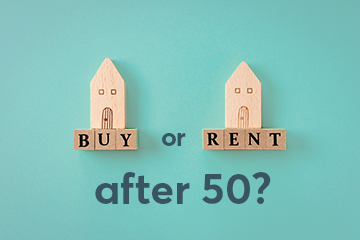Is a buy-to-let property a smart investment?

Keytrade Bank
keytradebank.be
January 04, 2024
(updated June 26, 2025)
3 minutes to read
In Belgium, the residential property market has always been a very attractive option for people who want to put their money to work. Buy-to-let properties offer a stable rental income along with the prospect of increasing in value over time, making this a popular strategy. However, as with any investment, they come with their own set of advantages, disadvantages and necessary considerations.
Buy-to-let advantages
• The potential rental income can be a nice, predictable and regular bonus to your other income or pension. • Historically, the value of residential property tends to rise in the longer term in Belgium. Such added value can result in significant gains when the property is eventually sold.
• Residential property be an effective way to hedge against inflation. If prices go up, the rental prices and your property's value will tend to rise as well.
• Owning additional property other than your own home can help to diversify your assets alongside cash, securities and other investments. • Short-term price fluctuations are less pronounced for residential property than for securities.
• If you improve the quality of the home and make it more energy-efficient, you will receive government subsidies and tax relief. Such investments will also increase the property's value. Belgium's three regions encourage buyers to renovate their properties with grants and tax relief. Some examples include the reduced VAT rate for demolition and reconstruction work and the government's renovation grant.
• Landlords benefit from low taxes on their rental income. If your tenants are not using the property for professional purposes, Belgium currently doesn't tax the actual rental income (unless the tax authorities regard the rental income as professional income).
How your rental income is taxed
If you are letting a property for residential use, you will generally be taxed at a flat rate based on the property's indexed rateable value, which is known as 'kadastraal inkomen' (KI) or 'revenu cadastral' (CI). The tax authorities increase this indexed rateable value by 40% to achieve the taxable basis. A progressive tax rate is then charged as part of your personal income tax. This is a somewhat complicated system, but it is important to remember that it tends to be a very attractive setup for landlords and your actual rental income wil not be taxed as in most other countries. In certain cases, however, the tax authorities may decide that your rental income is the result of professional activities and will consider them as professional income. This is often the case when you let multiple homes and/or you have taken out several loans to invest in rental property. In such cases, the actual rental income becomes taxable and you will likely end up paying twice the amount of tax you would have paid otherwise. This does mean that you can deduct costs for maintenance, fire insurance, the building manager and so on if you can provide the necessary proof. However, this setup is usually far less tax efficient in the end. In other words, make sure you have all the information you need before you buy to let!
Buy-to-let disadvantages
• Investing in residential property costs a lot of money, but securities can be purchased with smaller amounts. You also need plenty of equity to invest in property. You won't be able to borrow 100% of the purchase price. You will always have to pay a deposit.
• When you buy the property, you will be charged legal fees (for the property deed and the mortgage deed if you have one), stamp duty and possibly other costs. You will also pay an annual property tax and you may be charged other taxes. If you own an apartment, you also have to take into account the cost of the building manager and the service charge for the maintenance and repair of the building's common areas and amenities.
• If you sell an additional home within 5 years, you will be charged capital gains tax (16.5% on profits plus a local tax). Buying to let should therefore be a long-term investment.
• Managing and maintaining a property takes time and money. Any renovation costs, (major) repairs and work to meet the energy performance standards are also at your expense. If you buy a home with a poor EPC score now, you will need to complete extensive energy renovation work within 5 years.
• Although residential property is generally considered a stable investment, house prices do also fall sometimes. In 2022, for example, inflation rose to 10.3% as house prices went up by 'only' 8% in Belgium. Taking inflation into account, this means real house prices fell by more than 2% in 2022.
• Tenants have rights and you can rarely terminate the agreement unilaterally. Letting your property also means a risk of default or late payments. And if you are without a tenant for a few months, you will be without an income as well.
• If you invest in property, you expose yourself to concentration risk. You are buying one type of building in one location. This means you are not spreading your risk. • Property and rental taxes are always evolving. Rules come and rules go. A private rental income tax regime based on a rateable value is still a thorn in the EU's side, and Belgium will have to change that one day. This is an important risk to bear in mind.
• Finally, you should consider your inheritance planning. What if you die (suddenly)? Do your partner and children want to manage the property when you are no longer around?
Important considerations before investing in property
Before you take the step to invest in a buy to let, there are some important considerations to bear in mind. The building's location is crucial. A good location will reduce the likelihood of it staying empty for long and will increase the value of your investment. Look at factors such as proximity to public transport, schools, shops and other amenities. In addition to location, energy efficiency has become an increasingly important factor over the past few years. The more energy-efficient your home is, the more attractive it will be to tenants.
Financial feasibility is another consideration. Calculate your potential income and expenses, including mortgage payments, maintenance costs, taxes and insurance premiums. This will help you to assess your potential return and cash flow.
It is also important to choose the right type of home. New builds may require less maintenance, but are often more expensive. Older homes may require more maintenance, but may have a more attractive purchase price. Also make sure you are aware of (any changes in) the rental legislation and other legal aspects. If this seems like too much homework, you can always consider investing in property that is listed on the stock exchange. Investing in property on the stock market is an alternative way to invest in property without the immediate obligations and challenges of owning physical bricks and mortar. Other advantages include a lower entry threshold (you can invest small amounts), diversification (your invested assets are not concentrated in one building) and liquidity (you can buy and sell 'paper bricks’ at the push of a button rather than having to go through a long list of legal steps in order to sell a physical property).
Looking for a home loan?
- Conduct a free and non-binding simulation.
- Interested in investing in property shares, trackers or funds on the stock exchange? Log in or open an account


